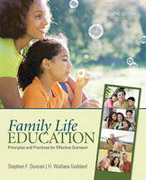
Family life education: principles and practices for effective outreach
Duncan, Stephen F.
Goddard, H. Wallace
Drawing on the best scholarship and their own years of professional experience, the authors of this thoroughly updated edition begin by discussing the foundations of family life education and encourage readers to develop their own outreach philosophies. The book then helps readers learn principles and methodsfor reaching out to the public and how to form and use community collaborations and use principles of social marketing to promote programs. The Second Edition contains five new chapters on education for personal well-being, marriage and relationship education, parenting education, sexuality education, and narratives of family life educators. The authors' practical, hands-on experience is used to demonstrate how readers can put principles from the latest and best scholarship into action and reinforced with the Interactive Explorations sections throughout. INDICE: Preface PART I: FOUNDATIONS OF FAMILY LIFE EDUCATION 1. Historicaland Philosophical Perspectives Defining Family Life Education A Brief Historyof Outreach Family Life Education Evolution in the Dissemination of Scientific Knowledge About Families Varied Approaches or "Roles" in Family Life Education Developing a Working Philosophy for Outreach Family Life Education Conclusion Explorations PART II: DEVELOPMENT OF FAMILY LIFE EDUCATION PROGRAMS 2. Designing Comprehensive Family Life Education Prevention Programs The Science and Profession of Prevention Prevention Education Models in FLE A Comprehensive Model for the Design of Family Life Prevention Programs Assessing Elements of Program Quality in Existing Programs Characteristics of Strong, Sustainable Family Life Education Programs Conclusion Explorations 3. Principles of Program Evaluation Evaluation as Friend and Foe: Stereotypes and Opportunities Establishing the Target: Vision and Goals Developing a Vision Getting Specific: ProgramGoals and Objectives An Example of an Evaluation Framework in Parenting Education Defining the Kind of Information Needed: The Evaluation Questions The Five-Tiered Approach to Program Evaluation The Logic Model Approach to EvaluationInnovations in Evaluation Using Evaluation Data Conclusion Explorations PART III: IMPLEMENTING FAMILY LIFE EDUCATION PROGRAMS 4. Designing Effective Instruction Component Display Theory First Principles of Instruction Conclusion Explorations 5. Engaging an Audience The Art of Teaching What Changes People? Challenging Ideas From Personality Theories Relationships as the Basis for HelpingPractical Applications Conclusion Explorations 6. Teaching Skills and Tools in Family Life Education Select Methods for Family Life Education Conclusion Explorations 7. Working With Diverse Audiences Sensitizing to Differences Diversity of Learning Styles Ethnicity and Values Skilled Dialogue Group FLE Examples Programming for Diversity Conclusion Explorations PART IV: CONTENT AND CONTEXTS FOR FAMILY LIFE EDUCATION PROGRAMS 8. Education for Personal Well-Being: Flourishing People Make Better Family Members Models of Well-Being The Practical Messages of Positive Psychology Educational Frameworks Conclusion Explorations 9. Marriage and Relationship Education by Stephen F. Duncan, Alan J. Hawkins, and H. Wallace Goddard Early Beginnings of Marriage and Relationship Education Current Theoretical and Empirical Foundations and Models for Practice Examples of the Three Emphases: Foundational Processes for Enduring Marriages Educational Frameworks Programs and Approaches Effectiveness of Marriage and Relationship Education Extension Service Programs and Results Creating Your Own Marriage and Relationship Education Program Challenges for the Future and Future Directions Conclusion Explorations 10. Parenting Education by Heidi E. Stolz History and Current State of Parenting Education Understanding Effective Parenting Understanding Effective Parenting Education Theoretical Models of Parenting Education Qualities and Competencies of an Effective Parent Educator Effective Delivery Formats Populations Served by Parenting Education Overall Effectiveness of Parenting Programs Evaluating Parenting Education Resources and Curricula Conclusions Explorations 11. Sexuality Education by Susan Calahan Sexuality Education Historical Overview Why Is Sexuality Education Important? Contemporary Theoretical Perspectives Used in Programming Sexuality Education Programs Adolescent Pregnancy Prevention STDs and HIV/AIDS Prevention Youth Development Programs Child Sexual Abuse Prevention Parent-Based Sexuality Education Best Practices in Sexuality Education Conclusion Explorations 12. Family Life Education on the Technological Frontier by Aaron Ebata and Steven A. Dennis The Technological Landscape Assessing the Credibility of Online Programs for FamilyLife Education Developing Online Programs for Family Life Education Conclusion Explorations 13. Working With the Media in Family Life Education by Tonya Fischio Mass Media and Outreach Family Life Education Understanding Traditional Media: Walk a Mile in Their Shoes Working With the Media: Playing on the Same Team Writing Guidelines Media Interviews Conclusion Explorations 14. Writing for the Lay Audience Purposes of Written Material Tips on Writing Examples of Effective Writing Conclusion Explorations PART V: PROMOTING, MARKETING, AND SUSTAINING FLE PROGRAMS 15. Creating Effective Collaborative Partnerships Defining the Collaborative Process Advantages of Collaboration Challenges to Collaboration A Community Linkages Framework Assessing the Effectiveness of Your Collaboration Getting Started: Steps for Creating Effective Collaborative Partnerships Conclusion Explorations 16. Marketing Family Life Principles, Practices, and Programs The Social Marketing Mix Crafting Marketing Messages to Foster Change Conclusion Explorations 17. Narratives of Family Life Educators Where Do Family Life Educators Work? Venues, Settings, and Profiles Pathways Into the Profession of Family Life Education -- The Authors Conclusion Explorations 18. Improving the Practice of Family Life Education Professionalization of Family Life Education Program Rigor Program Effectiveness Marketing of FLE Principles,Practices, and Programs Reaching Diverse, Underserved Audiences Conclusion Explorations Appendix A: A Statement of Principles by H. Wallace Goddard and Charles A. Smith Appendix B: Family Life Education Content Areas: Content and Practice Guidelines Appendix C: Family Life Education Program Resource Review Form Appendix D: A Selection of Favorite Movie Clips for Family Life Education Appendix E: Ethics and Family Life Education References Author Index Subject Index About the Authors
- ISBN: 978-1-4129-7908-5
- Editorial: Sage Publications
- Encuadernacion: Rústica
- Páginas: 496
- Fecha Publicación: 25/01/2011
- Nº Volúmenes: 1
- Idioma: Inglés
